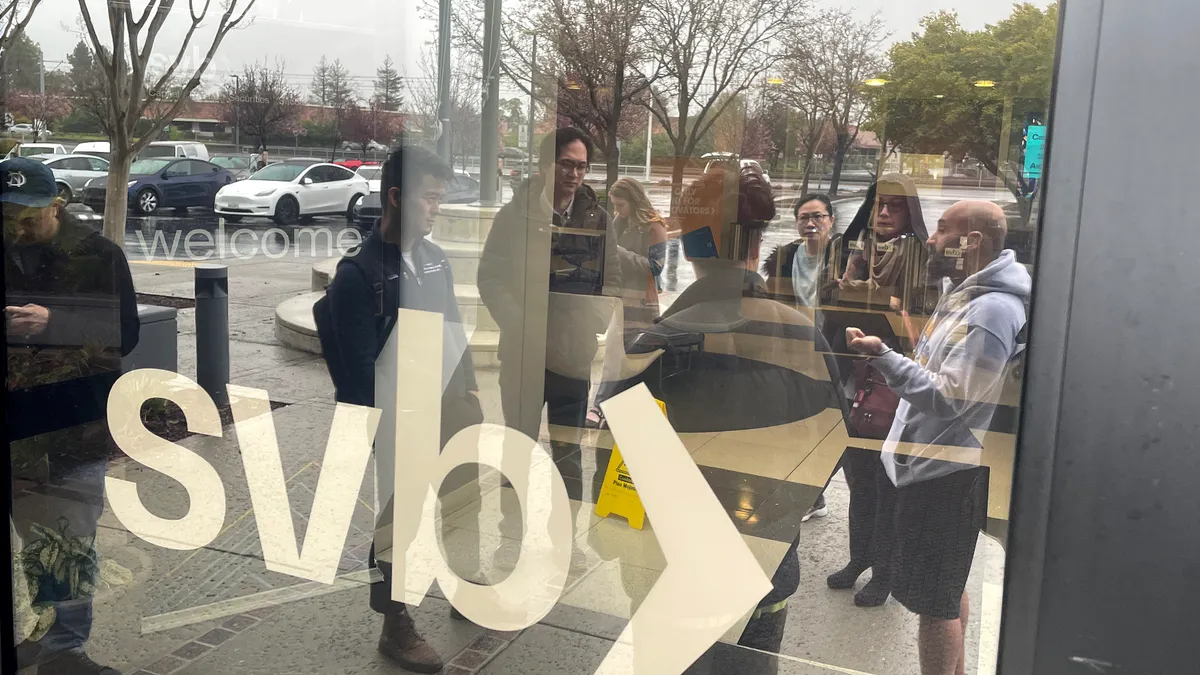The CEOs of bank payment processors Fiserv and Jack Henry & Associates suggested their bank clients are powering through an industry crisis that included regulators taking over two banks in recent days.
Signature Bank was shuttered by New York regulators Sunday and federal regulators took over Silicon Valley Bank on Friday after a surge in depositors taking money out of the bank. As a result, the stock prices of other regional and mid-sized banks like First Republic Bank suffered, as investors worried about similar scenarios unfolding.
Although Silicon Valley Bank was a core processing client of Fiserv, CEO Frank Bisignano, speaking at a Wolfe Research investor conference this week, downplayed the impact of the banks’ failure on his company’s business.
At SVB, “we were shoring up the defense and thinking about offense” last week as the bank’s collapse began to take shape, he said during his Tuesday appearance at the Wolfe Fintech Forum. Although the company had “a growing relationship with Signature (Bank) that was very, very strong” Fiserv didn’t count that bank as a core customer, he said.
He said most of Fiserv’s bank clients – many of whom Fiserv is aiding with digital transformation – are “not really focused on this,” Bisignano said.
“I’m not saying we don’t have a problem in the system,” but the vast majority of Fiserv clients keep a steady hand on the wheel, he said. For about 90% of Fiserv’s customers, “their volumes on Monday in and out were exactly the same,” he said.
Given his past leadership roles at JPMorgan Chase and Citigroup, Bisignano recalled some of his experience during the Great Recession during his presentation. For financial institutions, the playbook for such moments includes “how you batten down the hatches, how you protect the franchise, how you take care of your client,” he said.
Baird Equity Research analysts estimated Fiserv’s exposure to the SVB situation was $15 million to $20 million of its annual revenue. In contrast I, the Baird analysts estimated the banking crisis could have a combined $50 million impact on rival FIS’s annual revenue, though that still accounts for less than 1% of overall that company’s revenue.
Payments flow under Fed control
With SVB now closed, however, the Federal Deposit Insurance Corporation-created Deposit Insurance National Bank of Santa Clara is now Fiserv’s client, Bisignano said.
In such situations, as happened with SVB, the FDIC steps in to run the bank and Fiserv connects with the agency, which provides the go-ahead for Fiserv to continue its work. “We’re not going to continue to do that unless we get told to, or else we’re going to create risk in the system,” Bisignano said.
“Today, in some strange way, we actually are doing more for them than we were on Thursday,” he said with a laugh. A spokesperson didn’t immediately respond when asked for further comment on that statement.
The company’s exposure and what Fiserv is seeing from its customer base currently doesn’t affect Bisignano’s view of the company’s growth targets for the year. Although the number of banks has shrunk over time, Fiserv makes money on transactions and accounts, which have grown significantly since the financial crisis of 2008, he noted.
Now that the company is set up with DINB, and given Fiserv’s market share and breadth of services, “I expect to be servicing more accounts, not less, and doing more transactions,” he said.
Jack Henry CEO weighs in
The stocks of both Fiserv and Jack Henry, which similarly provides payments processing and technology services mainly to mid-sized banks and credit unions, declined between Thursday and Monday, reflecting investor worries that the bank contagion could spread to other financial institutions and adversely impact companies that service them. Nonetheless, the shares began to recover Tuesday.
Also speaking at the Wolfe conference, Jack Henry CEO David Foss said a small number of his company’s bank clients he had talked to as of Tuesday were relatively unruffled by the situation.
“The ones I've talked to, and the ones that I've received messages from, they're feeling very positive about their franchises, and about their ability to continue to compete,” he said of his company’s clients, without identifying them. “They're frustrated, I would say, because they're having to message all kinds of consumers who don't understand what's happening.”
Foss emphasized that consumers and investors seem to be over-reacting to the situation, and that he doesn’t see his company’s customers ultimately being hurt significantly by the industry turmoil. “There's not any great risk to our customers that I can see, but it's a challenging, frustrating time for them right now because there's so much confusion out there,” he explained. “A lot of it, of course, is fueled by social media, and this kind of hysteria about ‘oh, the banking system is going is to go down the drain,’ that's just not the position that we're in.”
He complimented the federal and state regulators for making the moves they did to shore up the system and reassure depositors that their money would be safe. That included a statement from the federal government that it would protect Silicon Valley Bank depositors beyond the normal FDIC-insured $250,000 level.
“Those moves are really, really terrific and really send a great message, and our customers I know are using that to try and educate their customers on what the environment looks like,” Foss said.



















